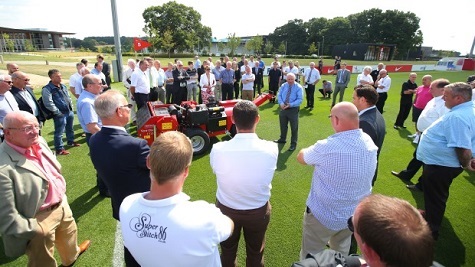

In 2023, I wrote a series of monthly articles, and their key purpose was to help all readers increase their understanding of sustainability, learn from the experiences of others and help them deliver sustainable practice in their own organisations and operations. In this new series, I am taking the opportunity each month to look in more depth at individual organisations. How are they seeking to be more sustainable and, importantly, how are they seeking to advise and support members or customers?
This month we focus on LANTRA, an important organisation in terms of education and training and I am grateful for their time in meeting me to discuss these issues.
Lantra is a leading provider of training, qualifications and career information for the land-based industries across the UK and Ireland. It has been an awarding body for over 40 years and develops training and nationally recognised qualifications under the main banner of Lantra Awards. However, Lantra, as a not-for-profit organisation, is committed to being a sector lead, promoting its activities, undertaking market research and leading on the development of initiatives, such as attracting new entrants through apprenticeships and the like. As example, at the last Oxford Farming Conference, Lantra presented its findings on the barriers to farm businesses hiring apprentices, following extensive research and survey. They would like to undertake similar work for the amenity and turf sector.
Being more sustainable as an organisation
Lantra is committed to enabling sustainable practice across the workforce and operating sustainably as a responsible business. They are implementing this change by ensuring compliance with government guidelines, encouraging staff to adopt sustainable principles and practice and promoting sustainable practices to industry. An internal scoping study has been undertaken on emissions and how they can be better managed, which has resulted in a series of actions for implementation. The Lantra Head Office is based at Stoneleigh Park in Warwickshire, a very convenient location, but its offices were built some time ago and certainly not with energy efficiency in mind at that time. Within the possible, they are addressing this with the introduction of lower energy using lighting and more efficient heating as part of this. Plans are in hand for the installation of solar panels.
E-cards and e-certificates are fundamental to becoming more sustainable, efficient, and cost effective, with many learners and employers now expecting or preferring to receive certificates digitally. Lantra is well respected for its technical materials, they are now looking at trialling solutions that move the business away from high print volumes towards more digital solutions that will be attractive to learners, enable easy updates and reduce print waste.
Other actions include rail travel, car sharing and hybrid working to reduce staff travel. Staff training has been introduced to improve both awareness and team involvement in the search for more sustainable practice and moves to more digital ways of working.
Training and qualifications
In terms of their offer on training materials and qualifications, they have commissioned external specialists to review both existing qualifications and learning materials across the board, in preparation for re-writes, as needed, to better reflect sustainable practices and objectives. They have also engaged in discussions with providers, seeking to identify new qualifications that might be needed, relating to national sustainability goals and changes in practice already being adopted in the sector. Reflecting changing ways of learning, they are looking at increasing the number of bite size courses on topics such as, for example, establishing and maintaining green rooves, and in assisting organisations in the analysis of processes and supply chains (life cycle analysis) to improve sustainably in their practices. They see sustainability not as a separate subject, but integral to all they seek to deliver and assess within their qualifications offer and in their support to the sector.

Lantra can also facilitate the provision of a sustainability consultant to businesses to provide advice on becoming more socially and environmentally responsible. They seek to help the business involved to create more sustainable solutions to meet the needs of people and the environment, combined with the development of a successful business. Such work involves looking at the impact that a business is having on the environment (for example, their waste production) and then minimising that impact or better planning the use of resources. Sustainability consultants may also be brought in during a project from planning and building, through to restoration and reuse of land and property.
New Entrants
Driving forward with education and training also needs to attract new people into the sector. In that regard, Lantra has recently launched an online careers resource (www.lantra.co.uk/careers) that aims to help tackle a shortage of skilled workers in land-based and environment industries. By providing detailed information about the wide variety of careers, Lantra seeks to attract new talent from a more diverse range of backgrounds, helping the industry to flourish and meet a rising demand for creators and stewards of the nation’s green spaces. The goal is to break down the barriers to attracting new entrants and provide the workforce with the right tools and training that it needs to hone skills and develop careers. This will be achieved by engaging with businesses and local authorities to understand which common operational skills are most lacking, preventing overall service delivery. The need to deliver sustainable practice is key in attracting both new recruits to the sector and in updating existing.
Lantra is proud of its involvement as the lead partner in rolling out the inaugural Land-Based and Environment Learner of the Year Awards in 2023 and being run again in 2024. These awards are based on nominations from land-based colleges and employers from England and Northern Ireland and seek to celebrate the very best in the sector. In terms of judging, learners and apprentices commitment to sustainability is seen as a key element.
Partnership
Corrina Urquhart, Director of External Relations at Lantra, emphasised that key to achieving sustainable development is education and training, to maintain a balance between the interests of environment, economy, and society. She stated, ‘’ this is why sustainability is high on the agenda at Lantra. As a business, we are investing in a programme to improve the sustainability credentials of our headquarters. And at the sector-level, we are engaging with industry partners to develop a product portfolio that enables sustainable practice and helps us meet our net zero ambitions. As we fully transition to digital certification, we are also exploring the opportunities presented by e-innovation in the delivery of training, which also delivers to the sustainability agenda’’

An example of electronic delivery in our sector is BASIS Classroom which has been developed to help learners update and develop their skills in their own time and pace. To date much of the modules available has been agriculture focussed but recently a series of learning courses have been released under the title of Principles of Sustainable Amenity Management. Such development is not set to take the place of conventional learning but run alongside it and undoubtedly more developments will arise in future.
Conclusions
In any government policy statements, sustainability is generally mentioned. Commitment to achieving sustainability and carbon emission goals is a key priority. This commitment is undoubtedly important in application to the amenity sector and, for all engaged in amenity operations, integrated planning to achieve the most sustainable practice is something none can ignore. Understanding what this entails and acquiring the right delivery skills is essential. Lantra along with other such bodies operating in the sector such as BASIS Registration and City and Guilds are developing their qualifications and, working with approved education and training providers, seeking to assist the sector in this development.
From my discussions, it is clear that Lantra is seeking to grasp the challenge of encouraging more sustainable practice and integrated approaches to managing resources within a successful business and to provide the right qualifications and encouragement for all to acquire the essential skills required in an ever developing and growing amenity sector.
To quote Ted Turner, Founder and Chair of the United Nations Foundation, ‘’Education is the essential foundation for sustainable development."
Previous articles in this series
SUSTAINABILITY IN LOCAL AUTHORITIES
AN EXAMPLE OF SUSTAINABILITY IN MACHINERY SUPPLY
SUSTAINABILITY IN THE GOLF SECTOR
SUSTAINABLE PRACTICE IN THE AMENITY SUPPLY SECTOR